Effects of Not Changing Air Filter in Car: A Comprehensive Guide
A car’s air filter is an essential component that helps to keep the engine running smoothly. It is responsible for preventing dirt, dust, and other contaminants from entering the engine and causing damage. However, many car owners tend to overlook the importance of changing the air filter regularly. This can lead to a host of problems that can impact the performance of the vehicle and even cause long-term damage.When the air filter is not changed regularly, it can become clogged with dirt and debris, which restricts the flow of air to the engine. This can cause the engine to work harder than it needs to, leading to decreased fuel efficiency and reduced performance. Additionally, a dirty air filter can cause damage to other components of the engine, such as spark plugs and cylinders, which can be costly to repair. Read on to find out of effects of not changing air filter in car.
Key Takeaways
- Regularly changing the air filter is essential to keep a car’s engine running smoothly.
- A dirty air filter can lead to decreased fuel efficiency and reduced performance.
- Neglecting to change the air filter can cause long-term damage to the engine and other components.
Importance of Air Filter in a Car
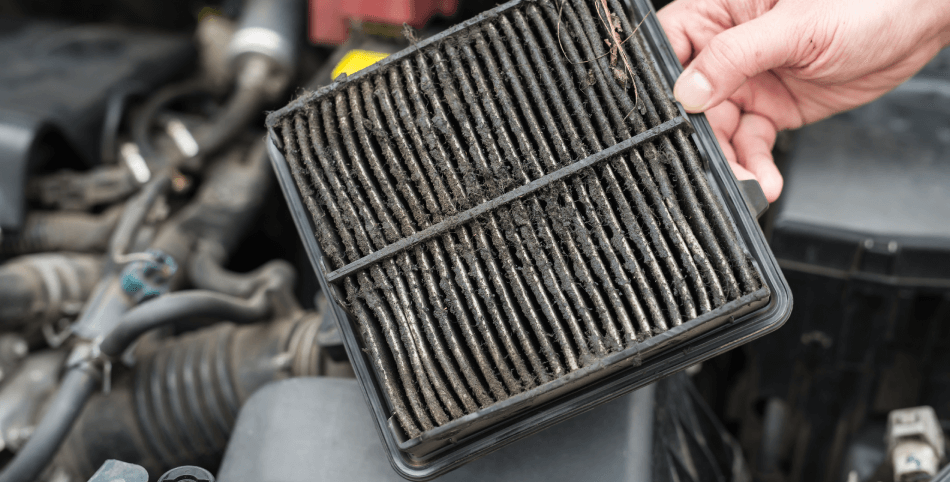
The air filter is an essential component of a car’s engine, and it plays a crucial role in maintaining the engine’s performance and longevity. The primary function of the air filter is to prevent dirt, dust, and other contaminants from entering the engine’s combustion chamber. The air filter is located between the engine and the air intake system, and it filters the air before it enters the engine.
The engine air filter is a vital component of the combustion process. When the engine runs, it sucks in air and fuel, which are then mixed and ignited to produce power. The air filter ensures that the air entering the engine is clean and free of contaminants, which can cause damage to the engine’s internal components. A dirty or clogged air filter can reduce the amount of air entering the engine, which can lead to reduced engine power and performance.
Regular maintenance of the car air filter is crucial to ensure that the engine runs smoothly and efficiently. Over time, the air filter can become clogged with dirt and debris, which can restrict the airflow to the engine. This can lead to reduced engine power, decreased fuel efficiency, and increased emissions. In extreme cases, a clogged air filter can cause engine damage and failure.
Replacing the air filter at regular intervals is an essential part of car maintenance. The frequency of air filter replacement depends on several factors, such as driving conditions, environment, and vehicle make and model. It is recommended to replace the air filter every 12,000 to 15,000 miles or as per the manufacturer’s recommendations.
In conclusion, the air filter is an essential component of a car’s engine, and it plays a crucial role in maintaining the engine’s performance and longevity. Regular maintenance of the engine air filter is necessary to ensure that the engine runs smoothly and efficiently. A dirty or clogged air filter can lead to reduced engine power, decreased fuel efficiency, and increased emissions. Therefore, it is essential to replace the air filter at regular intervals to keep the engine running smoothly.
What Happens When Air Filter is Not Changed
When a car’s air filter is not changed, it can lead to a variety of negative effects on the vehicle. Over time, dirt, debris, and other contaminants can accumulate on the filter, causing it to become clogged. This can lead to a decrease in airflow to the engine, which can result in decreased engine performance, reduced acceleration, and even stalling.
The engine’s throttle body can also become clogged with dirt and debris, which can further decrease performance and lead to misfires. In some cases, a dirty air filter can cause the engine to emit smoke or produce other symptoms of decreased engine performance.
In addition to decreased performance, a dirty air filter can also cause damage to the engine over time. As the engine struggles to draw in air through a dirty filter, it can put additional strain on other components, such as the spark plugs and fuel injectors. This can lead to decreased fuel efficiency, increased emissions, and even engine damage.
To avoid these negative effects, it is recommended that car owners have their air filters inspected and replaced regularly. The exact replacement interval will depend on the make and model of the vehicle, as well as driving conditions and other factors. However, most experts recommend replacing the air filter every 12,000 to 15,000 miles or once a year.
In summary, not changing a car’s air filter can lead to decreased performance, increased emissions, and even engine damage over time. Regular inspection and replacement of the air filter can help ensure that the engine is running at peak efficiency and avoid costly repairs down the line.
Impact on Vehicle Performance
The air filter in a car is responsible for filtering out dirt, debris, and other contaminants from the air before it enters the engine. Over time, the air filter can become clogged with dirt and debris, which can impact the vehicle’s performance.
When the air filter is clogged, it restricts the flow of air into the engine, which can cause a decrease in engine performance and power. This can result in sluggish acceleration, reduced power, and poor overall performance. The engine may also produce strange noises or emit unusual odors.
In addition to decreased performance, a clogged air filter can also have an impact on fuel efficiency. When the engine is not receiving enough air, it may not be able to burn fuel efficiently, which can result in decreased fuel economy. This can cause the vehicle to consume more fuel than usual, which can be costly in the long run.
If the air filter is not changed regularly, it can also impact the engine’s overall performance. Over time, the engine may become damaged due to the lack of proper airflow. This can result in decreased engine performance, which can lead to costly repairs.
To avoid these issues, it is important to change the air filter regularly. The frequency of air filter changes can vary depending on the make and model of the vehicle, as well as the driving conditions. As a general rule, it is recommended to change the air filter every 12,000 to 15,000 miles or once a year, whichever comes first.
In summary, not changing the air filter in a car can have a significant impact on the vehicle’s performance, power, acceleration, fuel efficiency, and engine performance. Regular air filter changes can help ensure that the engine is receiving proper airflow and can help prevent costly repairs in the future.
Effects on Engine and Components
When the air filter in a car is not changed regularly, it can lead to a variety of negative effects on the engine and its components. Dirt and debris can accumulate in the engine and cause damage to various parts. The engine air filter is designed to prevent such debris from entering the engine, but a clogged air filter will not be able to do so effectively.
One of the most common effects of not changing the air filter is a decrease in engine performance. A clogged air filter will restrict the amount of air that can enter the engine, which will cause the engine to work harder to get the air it needs. This can lead to reduced power and acceleration, as well as increased fuel consumption.
In addition to reduced performance, a clogged air filter can also cause damage to other components in the engine. The throttle body, which controls the amount of air that enters the engine, can become clogged with debris if the air filter is not changed regularly. This can cause the engine to stall or run poorly.
The oil filter is another component that can be affected by a clogged air filter. If the engine is not receiving enough air, it may not be able to burn fuel efficiently, which can cause the oil to become contaminated with unburned fuel. This can lead to engine damage and increased wear on the oil filter.
A clogged air filter can also cause problems with the spark plugs and head gasket. The spark plugs may become fouled with unburned fuel, which can cause misfires and poor engine performance. The head gasket, which seals the engine block and cylinder head, may also become damaged due to increased pressure and heat caused by a clogged air filter.
Finally, a clogged air filter can cause the check engine light to come on. The engine control module (ECM) may detect a problem with the air intake system and turn on the check engine light as a result.
In summary, not changing the air filter in a car can have a variety of negative effects on the engine and its components. It can lead to reduced performance, engine damage, and increased wear on other parts. It is important to change the air filter regularly to prevent these problems from occurring.
Influence on Air Quality Inside the Vehicle
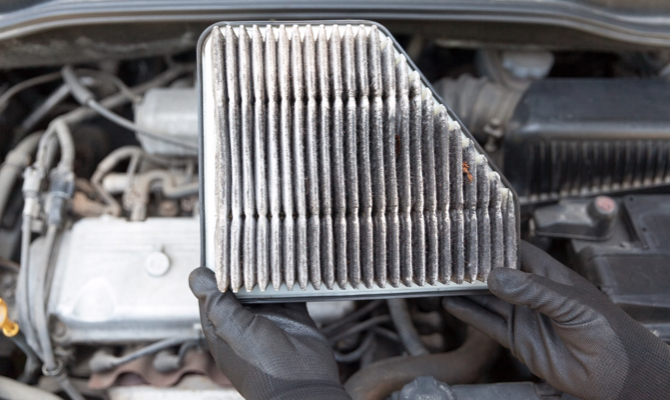
The air filter in a car plays a vital role in maintaining the air quality inside the vehicle. The air filter prevents dust, pollen, and other contaminants from entering the car’s cabin, ensuring that the passengers breathe clean air.
If the air filter is not changed regularly, it can become clogged with dirt and debris, reducing its effectiveness. A clogged air filter can result in reduced airflow to the cabin, which can cause a buildup of pollutants inside the vehicle. This can lead to poor air quality, which can have adverse effects on the health of the passengers.
When the cabin air filter is not changed in a timely manner, the heating and air conditioning systems can also be affected. A dirty cabin air filter can reduce the efficiency of these systems, leading to poor temperature control inside the car. This can cause discomfort for the passengers, especially during extreme weather conditions.
Moreover, a clogged air filter can also put additional strain on the car’s ventilation system, causing it to work harder to maintain adequate airflow. This can lead to increased fuel consumption and reduced engine performance.
In conclusion, not changing the air filter in a car can have a significant impact on the air quality inside the vehicle. It can lead to poor air quality, reduced efficiency of heating and air conditioning systems, and increased fuel consumption. It is recommended to change the cabin air filter at regular intervals to ensure that the passengers breathe clean air and the car’s systems function optimally.
Impact on Vehicle Longevity and Maintenance
Regular maintenance is crucial for the longevity of a vehicle. One of the most important aspects of car maintenance is replacing the air filter. Neglecting to replace the air filter can cause serious damage to the engine and other components of the vehicle over time.
When the air filter becomes clogged, it restricts the flow of air to the engine. This can cause the engine to work harder than it needs to, which can lead to decreased fuel efficiency and increased emissions. In addition, a clogged air filter can cause the engine to wear out faster, which can lead to costly repairs and even engine failure.
Replacing the air filter is a relatively simple and inexpensive maintenance task that can have a significant impact on the longevity of a vehicle. Most mechanics and technicians recommend replacing the air filter every 12,000 to 15,000 miles, or at least once a year. However, if the vehicle is driven in dusty or dirty conditions, the air filter may need to be replaced more frequently.
Regular oil changes are also important for the longevity of a vehicle. Clean oil helps to lubricate the engine and prevent wear and tear on its components. Neglecting to change the oil can cause the engine to become clogged with debris and sludge, which can lead to decreased performance and even engine failure.
In summary, neglecting to replace the air filter can have a significant impact on the longevity and maintenance of a vehicle. Regular maintenance, including air filter replacement and oil changes, is crucial for keeping a vehicle running smoothly and preventing costly repairs down the line.
Signs of a Dirty Air Filter
A dirty air filter can have several negative effects on a car’s performance. It is important to recognize the symptoms of a dirty air filter to avoid potential damage to the engine. Here are some signs that indicate a dirty air filter:
Reduction in Fuel Mileage
One of the first symptoms of a dirty air filter is a reduction in fuel mileage. A clogged air filter restricts the flow of air to the engine, which results in an improper air/fuel mixture. This causes the engine to work harder and consume more fuel than necessary, leading to a decrease in fuel efficiency.
Power Loss
A dirty air filter can also cause a loss of power and acceleration. When the air filter becomes clogged with dirt and debris, it restricts the flow of air to the engine. Without enough air, the engine cannot function at its optimal level, resulting in a decrease in power and acceleration.
Check Engine Light
A dirty air filter can trigger the check engine light on the dashboard. The engine control unit (ECU) detects a reduction in airflow and responds by illuminating the check engine light. If the check engine light comes on, it is important to have the car inspected by a mechanic to determine the cause of the issue.
Smoke
A dirty air filter can also cause smoke to emit from the exhaust pipe. When the air filter is clogged, the engine is not receiving enough air to properly burn the fuel. This can cause unburned fuel to exit the engine and result in smoke coming from the tailpipe.
It is important to check the air filter regularly and replace it when necessary to avoid these negative effects on the engine’s performance. A dirty air filter can cause permanent damage to the engine if left unchecked.
Air Filter Replacement Process
Replacing the air filter is a crucial part of car maintenance that should not be overlooked. A clean air filter ensures that the engine is receiving enough air to function efficiently. It is recommended to replace the air filter every 12,000 to 15,000 miles or as advised by the manufacturer.
The air filter replacement process is straightforward and can be done by following a few simple steps. It is recommended to consult the car’s manual for specific instructions.
First, locate the air filter housing unit, which is usually located near the engine. The housing unit can be opened by either unscrewing it or unclipping it, depending on the car’s make and model.
Once the housing unit is open, carefully remove the old air filter and inspect it for any damage or excessive dirt. If the filter is dirty or damaged, it should be replaced immediately.
Next, clean the air filter housing unit by removing any debris or dirt that may have accumulated inside. This can be done using a soft brush or by wiping it down with a damp cloth.
After cleaning the housing unit, insert the new air filter into the housing unit, making sure it is properly seated and secured in place. Close the housing unit and secure it by screwing or clipping it back into place.
It is important to note that air filter replacement should not be delayed or skipped, as a dirty air filter can lead to reduced engine performance, decreased fuel efficiency, and even engine damage. Regular air filter replacement, along with routine oil changes and other maintenance tasks, can help keep the car running smoothly and efficiently for years to come.
If unsure about the air filter replacement process, it is recommended to consult a qualified mechanic or technician for assistance.
Conclusion

In conclusion, neglecting to change the air filter in a car can have several negative consequences. Reduced engine performance, increased emissions, and potential damage to the engine are just a few of the possible outcomes.
A clogged air filter restricts the flow of air to the engine, which can result in poor acceleration, lack of power, and even stalling. This can be especially problematic in situations where quick acceleration is necessary, such as merging onto a highway or passing another vehicle.
Additionally, a clogged air filter can lead to increased emissions. When the engine is not getting enough air, it may not be able to burn fuel efficiently, which can result in a higher amount of harmful pollutants being released into the environment.
Finally, neglecting to change the air filter can potentially cause damage to the engine. Dust and dirt particles can enter the engine and cause internal components to wear down more quickly. This can lead to costly repairs or even engine failure.
Overall, it is important to make sure that the air filter in a car is changed regularly. The exact frequency will depend on the make and model of the vehicle, as well as driving conditions, but a general rule of thumb is to have it changed every 12,000 to 15,000 miles. By doing so, drivers can help ensure that their car is running at its best and avoid potential problems down the road.

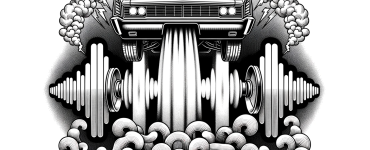
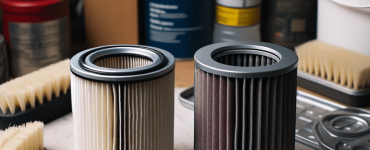
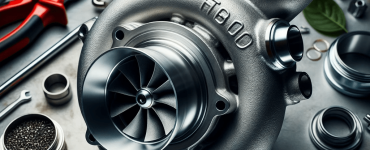
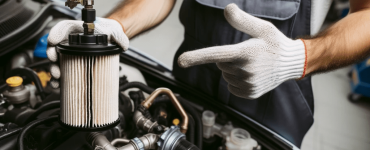
[…] air intakes typically consist of an airbox, an air filter, and an intake tube. The air filter is designed to remove contaminants from […]
[…] air filter, fuel filter, brake fluid, and coolant; inspect brakes, hoses, and […]
[…] Effects of Not Changing Air Filter in Car: A Comprehensive Guide […]
[…] cold air intake is typically made up of a few different parts. The air filter is the most important part, as it is responsible for filtering out dirt and debris from the air. The intake tube is the part […]